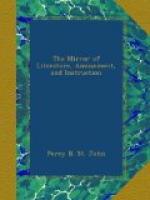* * * * *
PSALMODY.
(To the Editor of the Mirror.)
In my paper of the 22nd of August, on this subject, I promised to resume it on my next coming to London, which has been retarded by several causes.
In visiting the Churches of All Souls, and Trinity, the psalmody is by no means to be praised. It is chiefly by the charity children, the singing (or rather noise) is in their usual way, and which will go on to the end of time, unless by the permission of the clergy, some intelligent instructors are allowed to lead as in the Chapel of St. James, near Mornington Place, in the Hampstead Road. The author of the paper on Music, in your publication of the 6th of September, very fairly puts the question, “Why are not the English a musical people?” and he shows many of the interrupting causes. It may happen, however, that by cultivating psalmody in our churches and chapels, considerable progress may be made. The young will be instructed, and the more advanced will attend, and we know the power of attention (the only quality in which Sir Isaac Newton could be persuaded to believe he had any one advantage in intellect over his fellow men.)
It is much to be regretted that the poetry in which our Episcopal Psalms and Hymns are sung, is confined to the versions of Sternhold and Hopkins, and of Tate and Brady. The poetry of Sternhold and Hopkins is in general uncouth with some few exceptions. Tate and Brady have made their versification somewhat more congenial with the modern improvements of our language; but each confines himself to the very literal language of the Old Testament; Sternhold and Hopkins in this respect have the advantage of their successors, Tate and Brady; for the translations of Sternhold and Hopkins are nearer to the original Hebrew.
The main object of my hope is, that the version of the Psalms now in use may be altered, or rather improved, in such a manner as to manifest their prophetic and typical relation to Christianity, to which in their present form so little reference is to be perceived by those “who should read as they run.” A change or improvement in this respect would give a more enlivening interest in Psalmody. Dr. Watts has done this with great truth and effect, and the singing in the churches and chapels in which his version is in whole or in part introduced, proceeds with a more Christian spirit: and a vast improvement has sprung from this source, in the sacred music of those churches and chapels.
To illustrate this part of my paper, let me refer to the version employed in several of the new churches, and to the version of Dr. Watts, in the spiritual interpretation of the 4th Psalm. In the version first referred to, the words are—
The place of ancient sacrifice
Let righteousness supply,
And let your hope securely fix’d
On Him alone rely.




